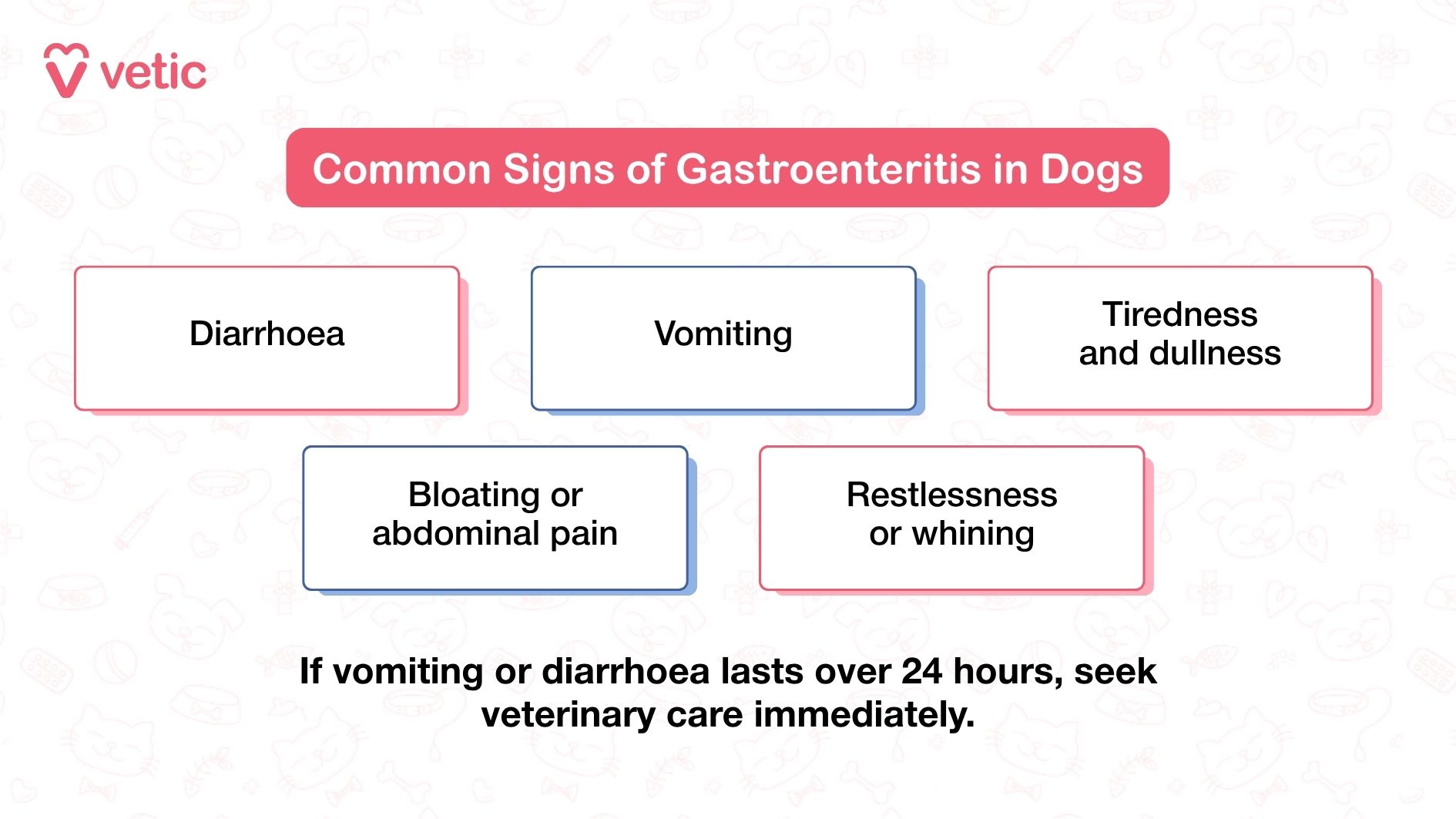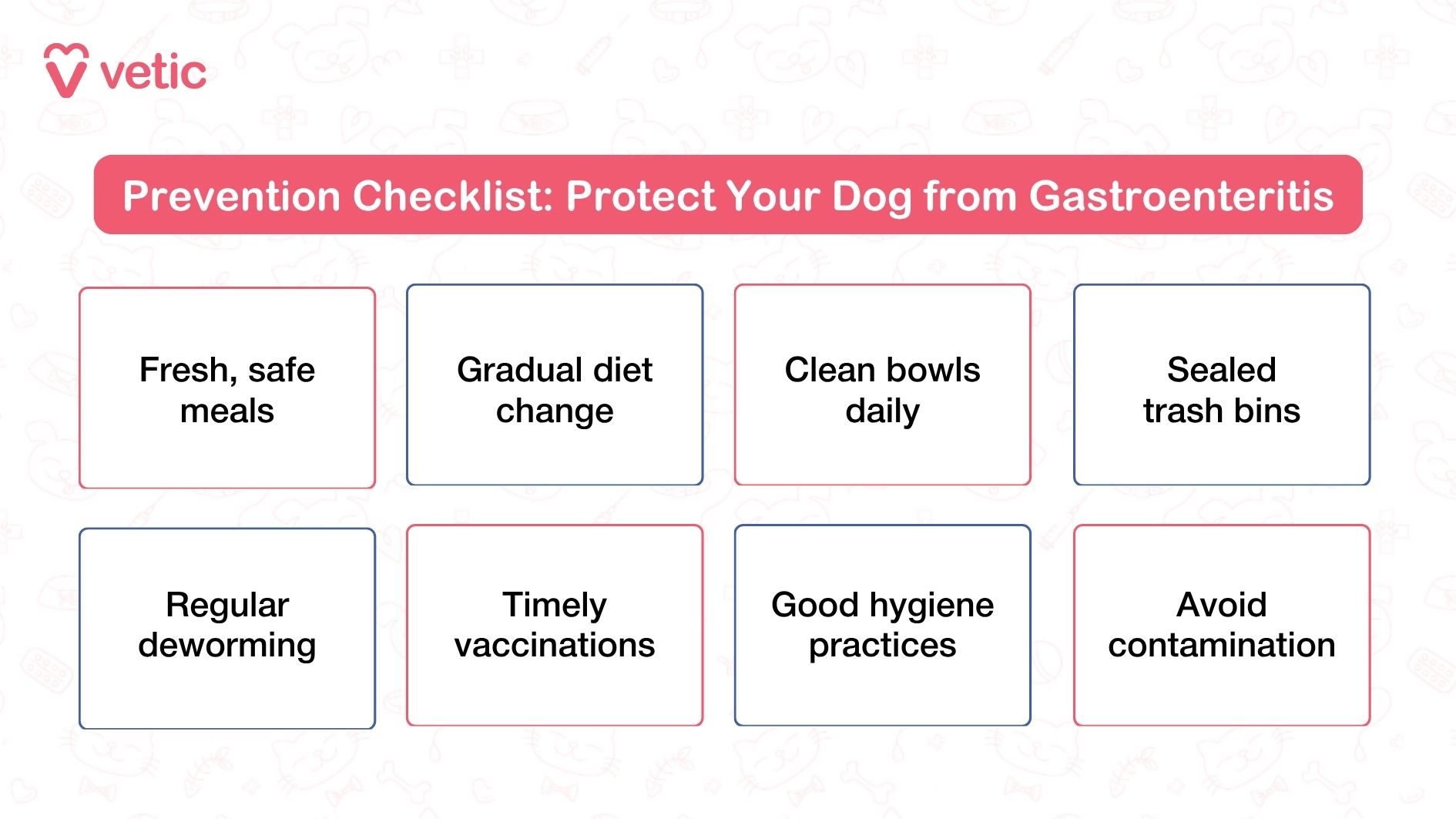What Causes Gastroenteritis in Dogs and Puppies?
Gastroenteritis in dogs can occur for several reasons, and often, more than one factor contributes to it. In many veterinary cases, “gastroenteritis” is used as a general diagnosis describing inflammation of the gastrointestinal tract rather than a specific infection.
Some of the most common causes include eating spoiled or contaminated food, sudden changes in diet, or ingesting toxic substances like pesticides or human medications. Dogs suffering from canine parvovirus, canine coronavirus, or bacterial infections such as E. coli and Salmonella are also prone to gastroenteritis. In older dogs, internal diseases like chronic kidney disease or liver problems can trigger this condition as well.
Puppies are especially vulnerable because their immune systems are still developing, and even minor dietary errors or exposure to dirty environments can make them sick.
What Is Acute Gastroenteritis in Dogs?
Acute gastroenteritis refers to the sudden onset of symptoms such as vomiting and diarrhoea that usually resolve with timely veterinary care. It can develop after eating spoiled food, swallowing something toxic, or contracting a mild infection.
Chronic gastroenteritis, on the other hand, is recurring or long-lasting. It often stems from ongoing issues such as food allergies, intestinal inflammation, or underlying diseases like pancreatitis or IBD (Inflammatory Bowel Disease).
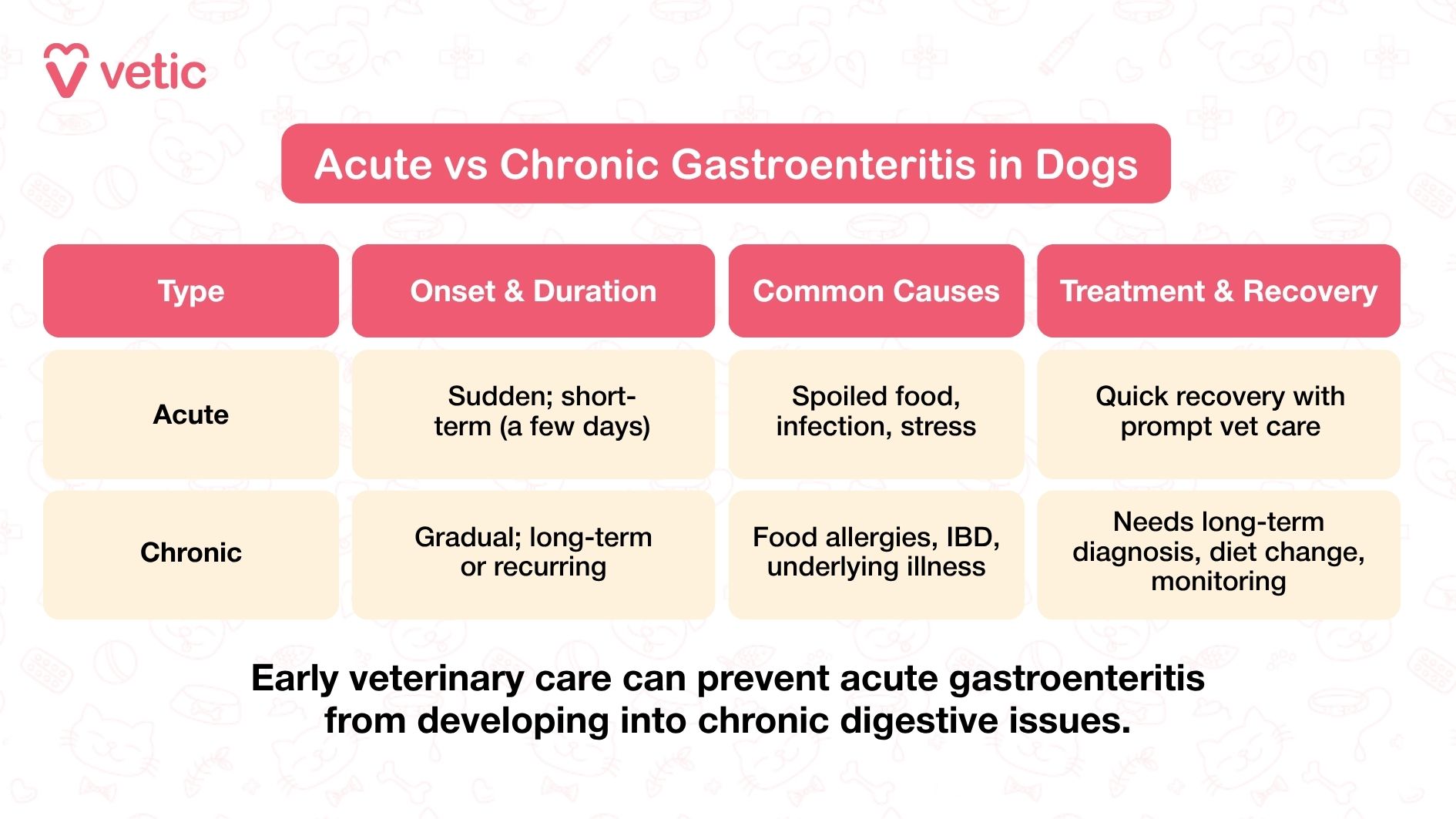
Difference Between Acute and Chronic Gastroenteritis
- Acute gastroenteritis appears suddenly and may resolve within a few days with prompt treatment.
- Chronic gastroenteritis recurs over time, requires more diagnostic work, and needs long-term dietary management.
Importance of Early Diagnosis and Prompt Treatment
Early diagnosis plays a crucial role in recovery. Continuous vomiting and diarrhoea can cause severe dehydration and electrolyte loss, which can become life-threatening if ignored. The sooner your dog receives veterinary care, the faster the inflammation can be brought under control, preventing complications like internal bleeding or organ strain.
What Are the Signs of Gastroenteritis in Dogs?
The symptoms of gastroenteritis often begin mildly but can escalate quickly. Most pet parents first notice their dogs passing loose or watery stools, followed by occasional vomiting or loss of appetite. The stool may have a foul odour or contain traces of blood.
As the condition worsens, your dog may show signs of weakness, abdominal pain, bloating, or complete refusal to eat or drink. In some cases, vomiting may turn frequent, and the vomit may contain yellow or frothy liquid, indicating stomach irritation.
If you notice persistent vomiting, blood in vomit or stool, or signs of dehydration such as dry gums and sunken eyes, seek immediate veterinary help. Waiting too long may lead to haemorrhagic gastroenteritis, which requires emergency fluid therapy and hospitalization.
Does Your Dog Have Gastroenteritis or Another Digestive Problem?
The signs of gastroenteritis can overlap with other digestive issues such as parvovirus, pancreatitis, or intestinal blockage. Differentiating between them is difficult without professional testing.
For example, parvovirus often affects unvaccinated puppies and causes foul-smelling, bloody diarrhoea. Pancreatitis usually occurs after eating fatty food and causes abdominal pain and fever. Intestinal blockage can cause your dog to strain without producing stool, with severe and repeated vomiting.
Because the symptoms can look similar, the best way to confirm gastroenteritis is through a veterinary examination and diagnostic testing.
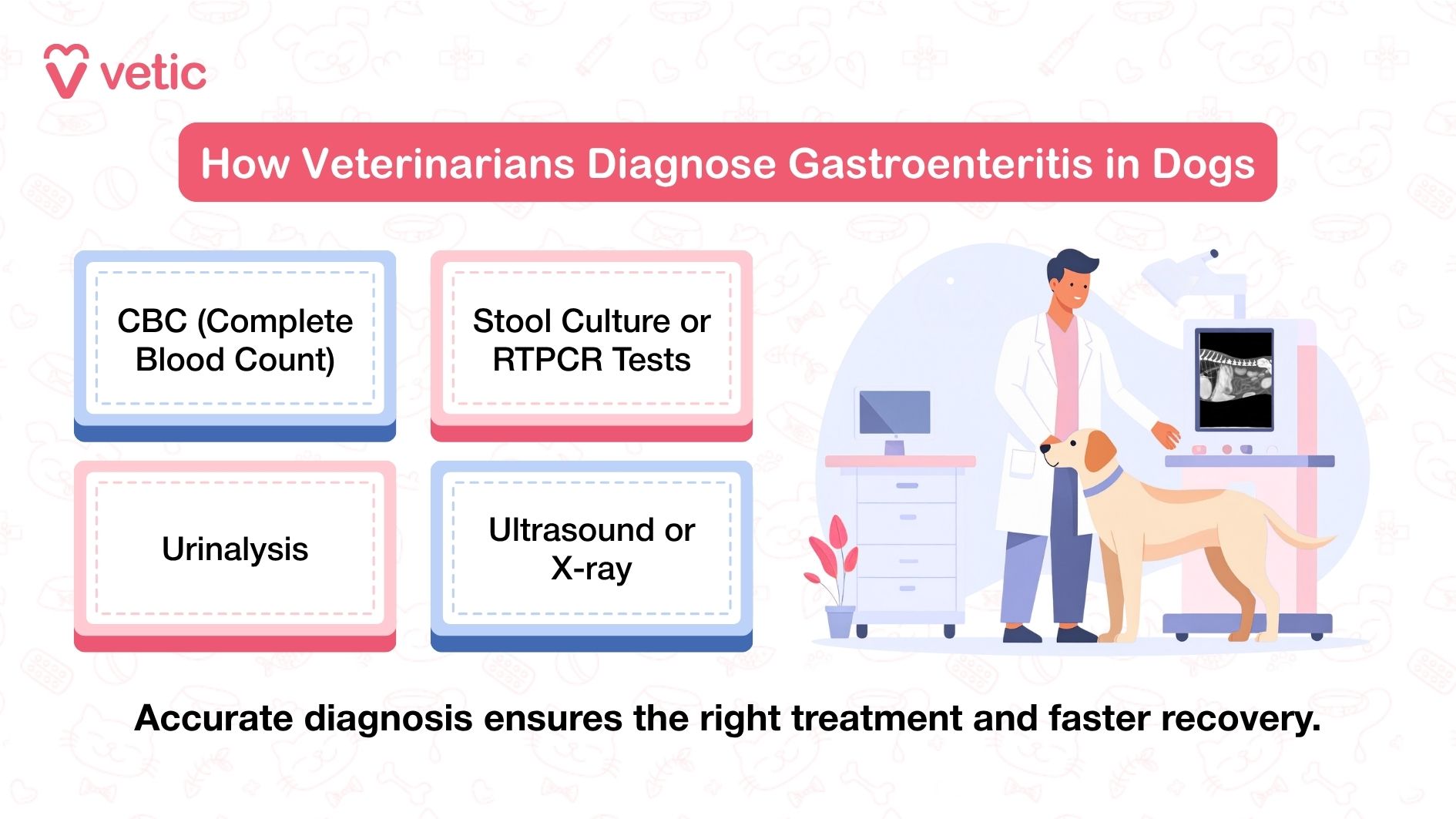
How Does a Veterinarian Diagnose Gastroenteritis in Dogs?
Diagnosis of gastroenteritis involves both observation and elimination of other possible causes. The veterinarian begins with a thorough physical examination to check your dog’s hydration, abdominal tenderness, temperature, and gum colour.
You’ll likely be asked questions about your dog’s recent diet, any new food or medication, toxin exposure, or previous episodes of vomiting and diarrhoea. Bringing your dog’s medical records and any recent lab reports helps your vet make a faster, more accurate assessment.
Common Laboratory Tests
To identify the cause and rule out other infections, your veterinarian may recommend:
- Complete Blood Count (CBC): to check for infection, inflammation, or anaemia.
- Stool examination or culture: to detect parasites or bacterial growth.
- Urinalysis: to assess hydration levels and kidney function.
Role of Imaging and Advanced Diagnostics
If your dog’s symptoms are severe or don’t improve with initial treatment, imaging tests such as abdominal ultrasound or X-rays may be required. These help identify internal swelling, gas build-up, or blockages.
Choosing a clinic equipped with in-house diagnostics and imaging, such as Vetic Pet Clinics, ensures quicker results and faster treatment.
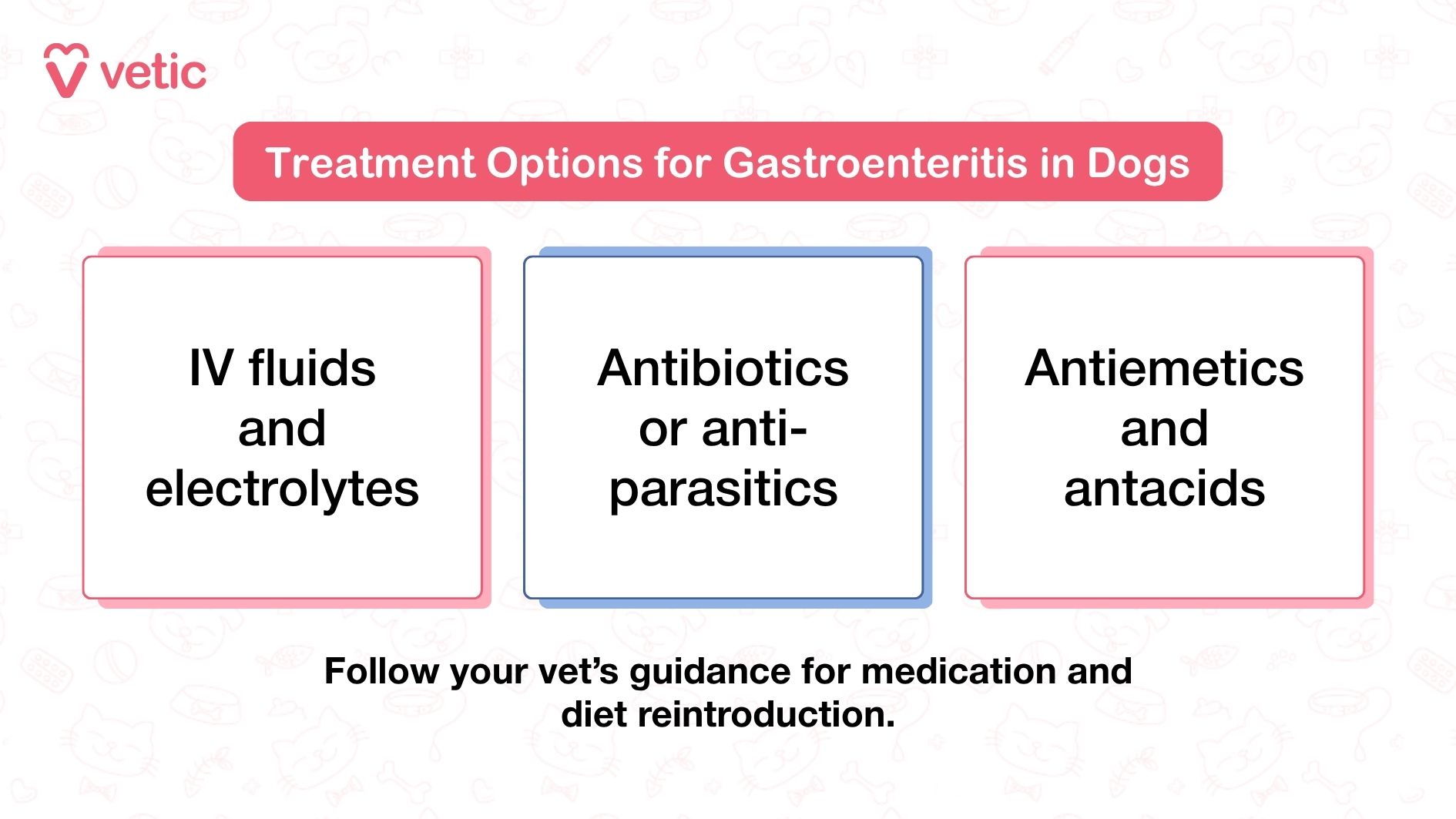
What Is the Treatment for Gastroenteritis in Dogs and Puppies?
Treatment depends on the cause and severity of the condition. The main goals are to restore hydration, control vomiting and diarrhoea, and allow the stomach and intestines to heal.
In mild cases, your veterinarian may suggest a short fasting period of about 12 to 24 hours to rest the digestive system, followed by a bland diet such as boiled chicken and rice. Probiotics and digestive supplements may also be prescribed to restore gut balance.
For severe cases, where the dog is dehydrated or passing blood in stool, hospitalization becomes necessary. The veterinarian will administer intravenous (IV) fluids, anti-nausea medications, and sometimes antibiotics or anti-parasitic drugs to control infection.
Do not attempt to give your dog any human medicine or over-the-counter drugs without consulting a vet — these can worsen the symptoms.
At Vetic Pet Clinics, every case of gastroenteritis is handled with a personalized treatment plan that includes fluid therapy, dietary advice, and continuous monitoring for quick and safe recovery.
Long-Term Recovery and Prognosis
Most dogs recover completely within a few days once proper treatment begins. However, the recovery time depends on the dog’s age, overall health, and how early the treatment starts. Chronic or untreated cases may lead to complications such as recurring diarrhoea, dehydration, or severe intestinal bleeding. Always follow your vet’s dietary and medication instructions during recovery.
How Can You Prevent Gastroenteritis in Dogs?
Prevention requires a combination of good diet management, hygiene, and regular veterinary care. Avoid feeding your dog spoiled, raw, or leftover food, and never let them rummage through the trash. Any sudden change in diet should be done gradually, ideally over 7–10 days, to allow the digestive system to adjust.
Keeping your dog’s feeding bowls clean, providing fresh drinking water at all times, and discouraging them from licking unknown objects outdoors can prevent bacterial contamination.
Regular vaccinations against canine parvovirus and canine coronavirus, along with timely deworming, are crucial preventive measures. These not only protect your dog from infections but also reduce the risk of secondary diseases that may lead to gastroenteritis.
Key Takeaways and When to See a Vet
Gastroenteritis in dogs can start as a mild stomach upset but may turn serious if ignored. Repeated vomiting, diarrhoea, or signs of dehydration should never be taken lightly. Early veterinary intervention ensures quick recovery and prevents complications.
Always keep your pet’s vaccination and deworming schedule up to date, maintain proper hygiene, and feed a balanced, vet-approved diet.
If your dog continues to vomit, refuses to eat, or shows any sign of weakness, book an appointment at your nearest Vetic Pet Clinic for prompt diagnosis and care. Our clinics are equipped with in-house diagnostics and 24×7 emergency facilities to help your pet recover safely.
You can also read more about related topics like Dog Dehydration and Stomach Problems in Dogs to better understand your pet’s digestive health.
1. What is gastroenteritis in dogs?
Gastroenteritis in dogs is the inflammation of the stomach and intestines, causing vomiting, diarrhoea, loss of appetite, and abdominal pain. It can result from infection, toxins, or dietary changes.
2. How long does gastroenteritis in dogs last?
Mild gastroenteritis in dogs usually improves within two to three days with proper hydration and vet care. Chronic or untreated cases may take longer and often need dietary management.
3. What are the first signs of gastroenteritis in dogs?
The first signs of gastroenteritis in dogs include vomiting, loose stools, bloating, and refusal to eat. If symptoms worsen or blood appears in vomit, visit a vet immediately.
4. Can I treat gastroenteritis in dogs at home?
You can manage mild gastroenteritis at home by offering a bland diet and keeping your dog hydrated. Always consult a veterinarian before home treatment to avoid complications.
5. When should I take my dog to the vet for gastroenteritis?
Take your dog to the vet immediately if vomiting or diarrhoea lasts over 24 hours, or if there’s blood, dehydration, or weakness. Severe gastroenteritis needs professional treatment.
6. What should I feed my dog after gastroenteritis?
Feed your dog easily digestible foods such as boiled chicken and rice in small portions. Avoid oily, spicy, or raw food until your veterinarian recommends returning to a normal diet.
7. How can I prevent gastroenteritis in dogs?
Prevent gastroenteritis by maintaining good hygiene, feeding fresh food, vaccinating against canine parvovirus and coronavirus, and deworming regularly. Avoid sudden diet changes or letting your dog eat from the trash.
References:
American Veterinary Medical Association. (n.d.). Gastroenteritis in dogs and cats. AVMA. Retrieved November 10, 2025, from https://www.avma.org
Cornell University College of Veterinary Medicine. (2023). Gastroenteritis in dogs and cats. Cornell University CVM. Retrieved from https://www.vet.cornell.edu
Merck Animal Health. (2023). Gastroenteritis in small animals. In The Merck Veterinary Manual. Retrieved November 10, 2025, from https://www.merckvetmanual.com/digestive-system/gastroenteritis/gastroenteritis-in-small-animals
PetMD Editorial Team. (2024). Gastroenteritis in dogs: Symptoms, causes, and treatments. PetMD. Retrieved November 10, 2025, from https://www.petmd.com/dog/conditions/digestive/c_dg_gastroenteritis
WSAVA Global Nutrition Committee. (2021). Nutrition guidelines for dogs and cats. World Small Animal Veterinary Association. Retrieved from https://wsava.org/global-guidelines/nutrition-guidelines/
American Kennel Club. (2022). Gastroenteritis in dogs: What you need to know. AKC. Retrieved November 10, 2025, from https://www.akc.org/expert-advice/health/gastroenteritis-in-dogs/
Centers for Disease Control and Prevention. (2023). Salmonella and E. coli infections in pets. CDC. Retrieved November 10, 2025, from https://www.cdc.gov/healthypets/diseases/salmonella.html
WSAVA Vaccination Guidelines Group. (2023). Vaccination guidelines for dogs and cats. World Small Animal Veterinary Association. Retrieved from https://wsava.org/global-guidelines/vaccination-guidelines/
UC Davis School of Veterinary Medicine. (2022). Canine gastrointestinal diseases and management. University of California, Davis. Retrieved November 10, 2025, from https://www.vetmed.ucdavis.edu

